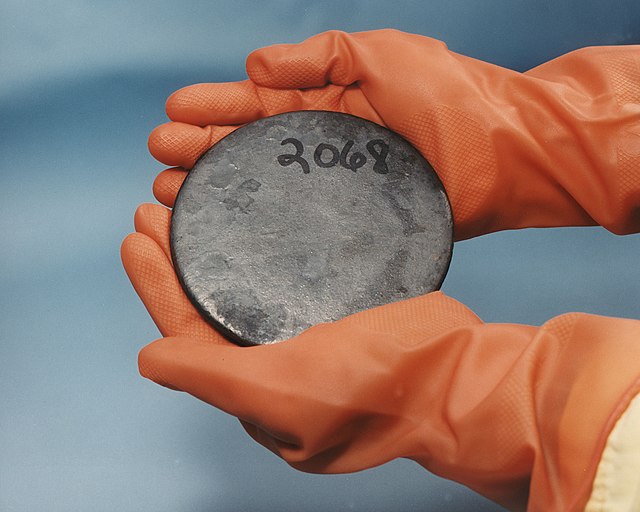Content deleted Content added
m |
|||
Line 15: When [[refining (metallurgy)|refined]], uranium is a silvery white, weakly radioactive [[metal]], which is harder than [[Hardnesses of the elements (data page)|most elements]]. It is [[malleability|malleable]], [[ductility|ductile]], slightly [[paramagnetism|paramagnetic]], strongly [[electronegativity|electropositive]] and is a poor [[electrical conductivity|electrical conductor]].<ref name="SciTechEncy"/><ref name="LANL">{{cite book |author=Hammond, C. R. |title=The Elements, in Handbook of Chemistry and Physics 81st edition |publisher=CRC press |year=2000 |isbn = 0-8493-0481-4 |url=http://www-d0.fnal.gov/hardware/cal/lvps_info/engineering/elements.pdf}}</ref> Uranium metal has very high [[density]], being approximately 70% denser than [[lead]], but slightly less dense than [[gold]].
Uranium-235 was the first isotope that was found to be [[fissile]]. Other naturally occurring isotopes are fissionable, but not fissile. Upon bombardment with slow neutrons, its uranium-235 [[isotope]] will most of the time divide into two smaller [[atomic nucleus|nuclei]], releasing nuclear [[binding energy]] and more neutrons. If too many of these neutrons are absorbed by other uranium-235 nuclei, a [[nuclear chain reaction]] occurs that results in a burst of heat or (in special circumstances) an explosion. In a nuclear reactor, such a chain reaction is slowed and controlled by a [[neutron poison]], absorbing some of the free neutrons. Such neutron absorbent materials are often part of reactor [[control rod]]s (see [[nuclear reactor physics]] for a description of this process of reactor control). | |||
 Article Images
Article Images